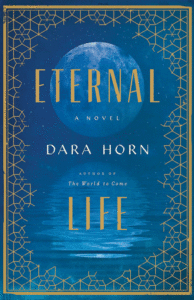Reviewed by NEAL GENDLER
If you think you’d like to live forever, novelist Dara Horn’s protagonist Rachel would suggest thinking again.

Rachel of Eternal Life has been around for 2,000 years, and she’s weary of it. She’s had numerous husbands — sometimes happily — and buried them. She’s had great numbers of children, grandchildren and great-grandchildren, some disappointing.
She’d like to die but can’t.
Additionally, and often annoyingly, she’s been visited across the millennia by her first love, Elazar, a young son of the Temple’s high priest. She won’t forgive him for causing the death of her first husband — not particularly loved — yet she’s putty in his arms.
Her appearance and mind age normally each time she’s a new person. At one of their meetings, Elezar asks, “How old do you think you are now?” She replies: “Eighty … something like that.” She kisses him as he embraces “her body that was still 18 years old, and always would be.”
Fortunately, the liner notes have told you of the pair’s immortality; otherwise, the first three chapters would be nearly incomprehensible. And preposterous as the central idea appears, Horn’s fertile imagination, plotting skills and good writing — especially of dialog — make the story feel credible; we suspend our disbelief just as we do while watching actors.
The story begins in Second Temple times, during Roman occupation. Rachel’s father is a scribe. Sitting beside him as he chants and writes sacred texts, she learns to read. She’s his runner, bringing him people’s blank scrolls and returning them completed. A regular client is the Temple, where handsome Elazar has had his eye on her.
They start meeting in a water tunnel, and nature takes its usual course.
Meantime, her father has taken in a scrawny, destitute young man, Zakkai. Father trains him as his assistant and eventually marries him to Rachel. Zakkai thinks he’s the father of Rachel’s child, Yochanan.
Young Yochanan suddenly falls ill and steadily worsens toward death. None of the standard Temple sacrifices restore his health, not even hair-shearing Nazarite vows. The high priest says one chance remains, and lying face down beside him on the Temple floor, she takes a vow, “an eternal bond with between you and God” at the price of living forever. “You will die without dying,” he says.
Yochanan recovers, becoming the Yochanan ben Zakkai who preserves Jewish scholarship. Well, why not?
The story bounces back and forth across two millennia, Rachel escaping each family situation when it becomes intolerable. Out of sight, she painfully burns herself like a Temple sacrifice only to come back as a new person in a new place.
We learn that Elezar took the same eternal vow, and after 300 years, they marry — blissfully until it’s clear they can’t again conceive. After a century together, Rachel leaves him so she again can have children.
Elazar last appears in our century, just as Rachel’s scientist granddaughter — another of Rachel’s many Hannahs — closes in on Rachel’s secret immortality.
All that only scratches the surface of this fascinating tale, in which Rachel keeps becoming new people while remembering her former incarnations.
Horn has written four previous, acclaimed books, including A Guide for the Perplexed, a 2013 Booklist Editors’ Choice, and In the Image, which won the 2003 National Jewish Book Award.
Eternal Life, officially out Jan. 23, is engrossing, written with compassion for its characters. It’s also witty and insightful, and frequently cites or has characters speak lines from Jewish texts — always naturally, appropriately and sometimes identifiably for gentiles. Horn acknowledges Ilana Kurshan for checking traditional texts and for an interpretation about Temple ash-clearing ritual in relation to family life from Kurshan’s If All the Seas Were Ink. (AJW Sept. 6)
At heart, Eternal Life is a love story of intriguing cleverness through which runs a gentle stream of quiet sadness. After its brilliant, double-mitzvah denouement, the novel ends in a short chapter in which Rachel finds peace in a new life. But for how long?
***
Neal Gendler is a Minneapolis writer and editor.



















